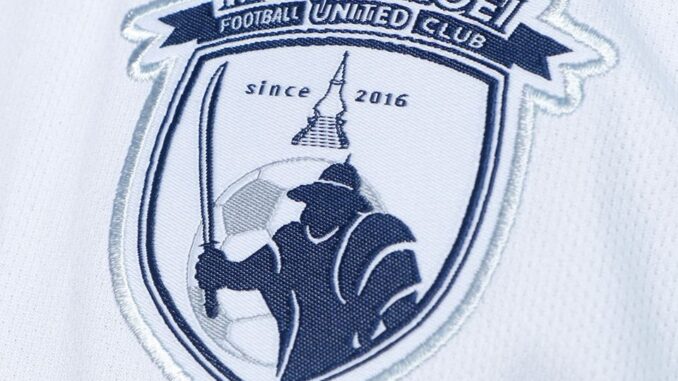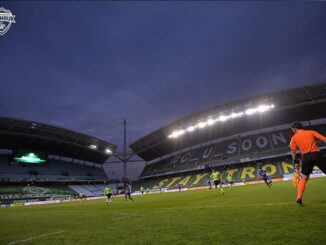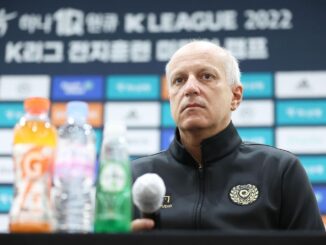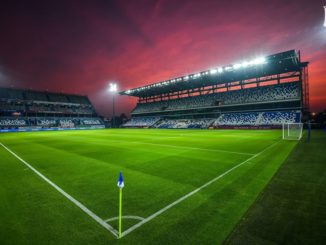
The COVID-19 crisis has hit clubs hard, especially those lower down the football pyramid.
Muang Loei United in particular have been impacted by two major post-COVID decisions from the Thai FA and face unique challenges as a result.
More than anything, this situation has served to stress-test the side’s long-term approach to development; should they emerge from the other side unscathed, they could become a role model for lower-division Thai clubs seeking promotion to the big time.
Thai Football has understandably and inevitably grind to a halt due to the COVID-19 pandemic, as the government mobilised at intense speed to curb the spread of the disease.
While there has been great success with reducing infection rates and COVID-related deaths in the country, the shutdown has caused a major economic fallout which has hurt business across the country – including football clubs.
Muang Loei United, like most other T3 clubs, have faced reduced returns from their sponsors and are struggling without live football to generate ticket gate revenue, which will not return until September. This state of affairs has presented a number of challenges to these clubs, who have had to use various strategies to combat the uncertainty of the present situation.
“The biggest challenge is getting the fanbase back,” Muang Loei board member and technical director Albert Mingphakanee told The Asian Game.
“Last year we moved our stadium from Wang Saphung Stadium to the Riverside Stadium in the city of Muang Loei,” he explains, noting how impressed the club was that 2,000 fans showed up to support them in their first home game in T3.
“The biggest problem is that after COVID, we never know what is going to happen. Is the fanbase coming back?”
However, that is far from Muang Loei’s only problem. The side have also been faced with an additional complication, becoming an unfortunate victim of the league’s dramatic post-COVID restructuring.
After comfortably topping the T4 Northeastern Region last season, the club navigated the division’s intense “Champions League Round”, eventually being one of four teams to earn promotion to T3.

However, Muang Loei and their fellow promoted sides Pathumthani University, Wat Bot City and Pattani City received rather troubling news. As a measure to reduce costs and respond to a reduced number of teams, the FA decided to combine T3 and T4 into a single, massive division to be known as the ‘National League’ – something that has not gone down well with Loei supporters and management after the effort they put in to get promoted.
“I don’t think it’s fair,” Mingphakanee says. “We sacrificed a lot from T4 to T3 last year, and now we have to be combined, it’s hard to take things in.”
Mingphakanee’s concern comes from the fact that many sides, which hadn’t put in as much effort or invested as much money as Loei did, will now be on equal footing when it comes to the tight race to qualify for T2.
Muang Loei, and the three other sides who face this same circumstance, may feel like they’ve gone right back to square one after a long campaign of hard work and sacrifice. The decision could still be reversed – but it is a volatility which has been very discouraging for the fate of lower-league Thai football.
Of course, this is not an easy situation to navigate, and tough choices were inevitable on the part of the administrative bodies.
“I think they are doing their best, I have to say,” Mingphakanee notes in his assessment of the Thai FA’s current decisions. However, he believes that lower-league football in Thailand could benefit from more specific attention and consideration to address the issues it faces.
“Most of the federation are focused on T1 and T2 because that’s where the majority of their income is,” he explains. “I want them to come look at T3 and T4 to see the problems more. There are a lot of problems that need to be fixed if they want this football to sustain for a long time.”
However, despite the unfortunate circumstances, Albert is optimistic that the side can turn the difficult situation around. In fact, the club have a lot of other factors working in their favor, should they capitalize on the situation.
For one, Muang Loei have opted for financial stability and aim to retain their current sponsors, giving them time with hopes of a return to normality soon.
“Our main sponsor is still [funding] us but our smaller sponsors right now have trouble dealing with money,” Mingphakanee revealed.
“We understand them because they have been with us for a long time, and we will do our best as a club to move forward to the best solution. We are not going to leave our sponsors and the sponsors will not leave us.”
“In the meantime, we are trying to find more sponsors to fill in the gap,” Albert notes, hoping to attract more investment from abroad to help supplement the clubs current finances.
He explained that returns on investment in T3 can be very high, as costs are still relatively low while the club is just one promotion away from having all their games televised in the second division.
“Maybe some people have that business opportunity where they see the club rising and the opportunity for us to go to T2 this year and could invest in us,” he said. “We are open to all sponsors right now.”
Muang Loei have also managed to raise revenue from their shirt sales, which was awarded as the best-designed strip for all divisions in the Thai League this season.
“Our biggest financial income will be from the clubs’ sales of shirts,” Mingphakanee reflected. “This shirt design [has helped] us generate more shirt sales than any other year, and that is an income that is feeding our club right now.”
It seems like the side will have their excellent blue-and-gold kit to thank for helping keeping their budgets balanced, and shows that the effort put in on that front can reap rewards beyond simple aesthetics.
Finally, the club invested heavily in their academy last season, promoting ten players to the first team. The influx of local boys into their squad has given them a strong backbone, allowing them to ride out the current financial difficulties and maintain a healthy roster of players despite the cuts they have been forced to make.
“The majority of teams in T3 and T4 do not have that academy to support [them],” Mingphakanee explains.
“Some of the clubs are only investing in players and buying players – and it’s going to cost a lot of money.”
It’s something which will not be sustainable with the financial difficulties currently faced by lower-league clubs.
“This year, we are trying to push young players because we believe in their talent, not because of the way we want to reduce our salaries,” Mingphakanee insists. “We really believe in their capability to bring this team forward.”
That young crop of players already showed their worth last season, outperforming all expectations to reach the last-16 of the League Cup despite being in T4 at the time.
Their 2-1 win over T1 side Suphanburi will live long in the memory of Loei supporters, and has attracted major interest in the club’s young players.
“What we decided to do is to give young players a chance to be successful in a top league,” Mingphakanee explained.
“We are never stopping these players from coming to show their true potential.”
With a supportive environment for their development and new openings in the squad due to the players who have been let go, there is now a major opportunity for the club’s academy to flourish when the league returns.
The strategies that are allowing Muang Loei to survive the COVID situation are the same good practices which clubs should implement to achieve long-term success.
Despite being hit with both the negative consequences of the extended break from football and the restructuring of the new ‘National League,’ the side have aimed to maintain current sponsor relationships, improve their merchandising and outreach, and built a strong backbone of young talent which gives them hope for the future.
Their current methods are being severely stress-tested by their current situation, but should they emerge out the other side, their experience could prove a useful guide for navigating the troubled waters of lower-league Thai football.
Photo: Muang Loei United




